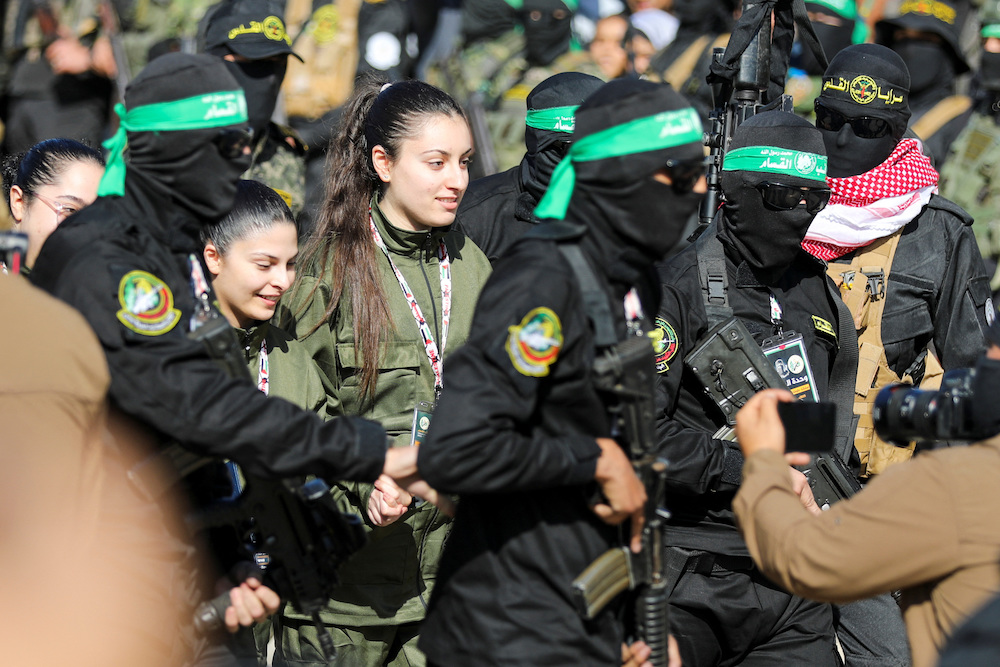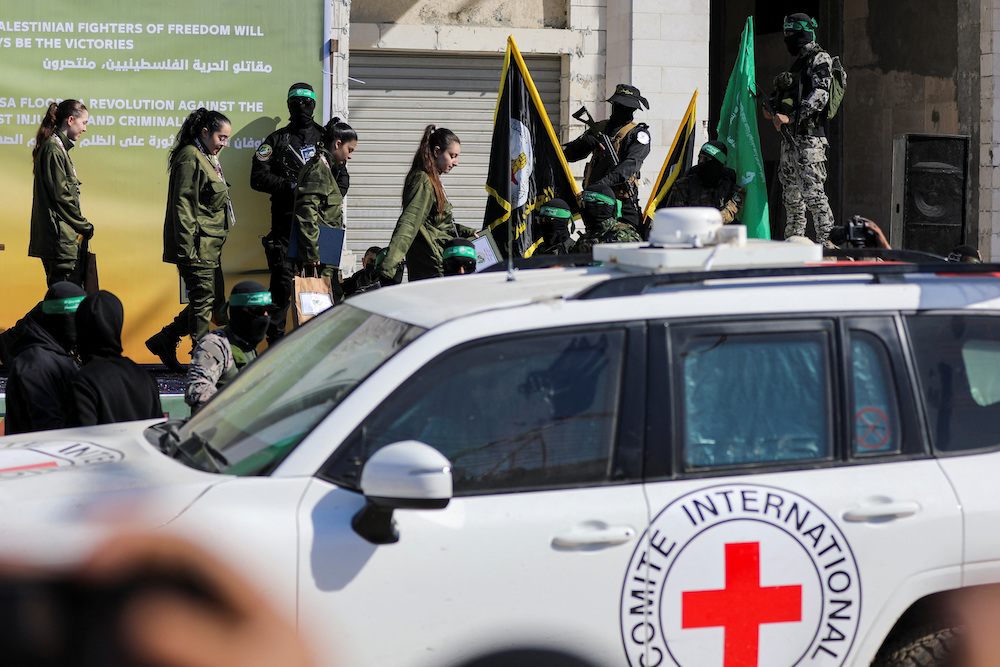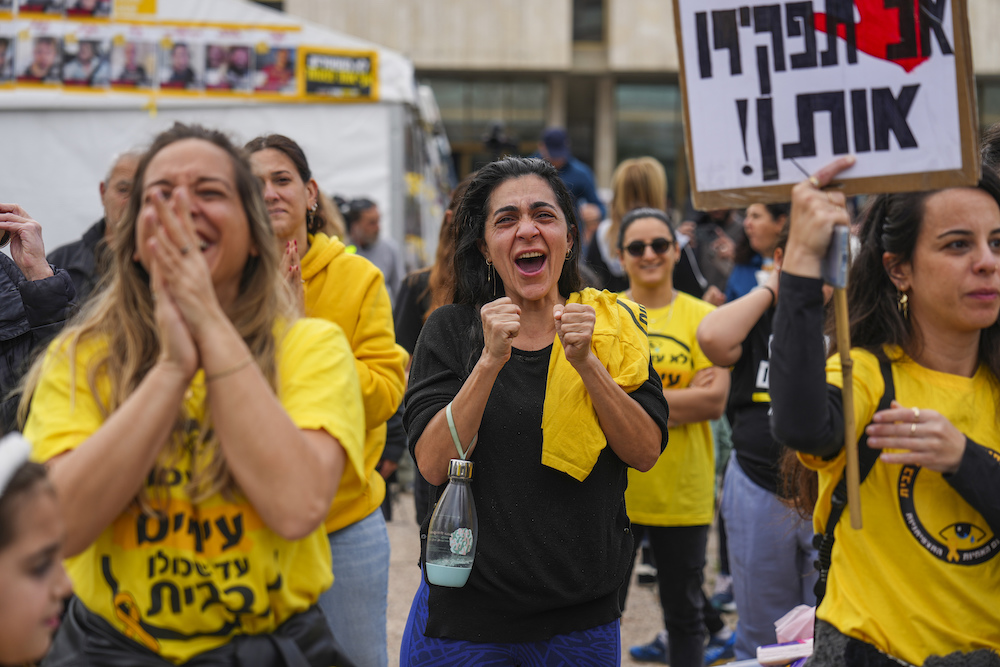CAIRO: Qatar is to resume issuing family and tourist entry visas starting July 12, in line with new travel and return and based on the health ministry COVID-19 developments recommendations, the interior ministry said on Twitter on Thursday.
The health ministry said in a statement Thursday that the new entry policies include providing a COVID-19 PCR test and classifying countries into three categories that would determine the quarantine policies.
Qatar to resume issuing entry visas starting July 12
https://arab.news/gxwed
Qatar to resume issuing entry visas starting July 12

- The health ministry said in a statement Thursday that the new entry policies include providing a COVID-19 PCR test
- Countries will be classified into three categories that will determine quarantine policies
Hamas frees four Israeli hostages to Red Cross in Gaza

- Israel is to free 200 Palestinian prisoners in exchange for the hostages
- The hostage-prisoner exchange is part of a fragile ceasefire agreement between Israel and Hamas
GAZA CITY, Palestinian Territories: Hamas militants on Saturday handed over to the Red Cross four Israeli women hostages under a truce deal in the Gaza war that is also expected to see a second group of Palestinian prisoners freed.
An AFP journalist witnessed the handover after the four were presented on a stage at a main square in Gaza City, where dozens of masked, armed militants had gathered earlier.
The Israeli military later confirmed they have received the freed hostages.
Four Red Cross vehicles had arrived ahead of the handover.
The fighters from Hamas and Islamic Jihad, carrying assault rifles and rocket-propelled grenade launchers, gathered in rows, many carrying their groups’ banners and wearing green headbands, as crowds of Gaza residents gathered to watch.
Israel confirmed Friday that it had received a list of the hostages’ names.
On Saturday, Palestinian sources said Israel is to free 200 Palestinian prisoners in exchange for the hostages.

According to the Israeli Hostage and Missing Families Forum, a campaign group, the women released are Karina Ariev, Daniella Gilboa, Naama Levy — all aged 20 — and Liri Albag, 19.
They had been held captive for more than 15 months, since Hamas’s October 7, 2023 attack on Israel.
Palestinians displaced by the war to southern Gaza should be able to begin returning to the north following Saturday’s releases, Bassem Naim, a member of Hamas’s political bureau based in Qatar, told AFP on Friday.
The truce has also led to a surge of food, fuel, medical and other aid into rubble-strewn Gaza but Israel’s UN ambassador on Friday confirmed that the UN agency for Palestinian refugees, Gaza’s main aid agency, must end all operations in Israel by Thursday.
The hostage-prisoner exchange is part of a fragile ceasefire agreement between Israel and Hamas that took effect last Sunday, and which is intended to pave the way to a permanent end to the war.
Mediators Qatar and the United States announced the agreement days ahead of US President Donald Trump’s inauguration. Trump has since claimed credit for securing the deal after months of fruitless negotiations.
Abu Obeida, spokesman for the Ezzedine Al-Qassam Brigades, Hamas’s armed wing, said on Telegram Friday that “as part of the prisoners’ exchange deal, the Qassam brigades decided to release tomorrow four women soldiers.”
Israeli Prime Minister Benjamin Netanyahu’s office confirmed it had received the names through mediators.
According to Israel’s prison service, some of the Palestinians released will go to Gaza, with the rest returning to the Israeli-occupied West Bank.
The ceasefire agreement should be implemented in three phases, but the last two stages have not yet been finalized.
“The worry and fear that the deal will not be implemented to the end is eating away at all of us,” said Vicky Cohen, the mother of hostage Nimrod Cohen.

In Gaza, families displaced by more than a year of war longed to return home, but many will find only rubble where houses once stood.
“Even if we thought about returning, there is no place for us to put our tents because of the destruction,” Theqra Qasem, a displaced woman, said.
During the first, 42-day phase that began Sunday, 33 hostages Israel believes are still alive should be freed in staggered releases in exchange for around 1,900 Palestinians held in Israeli jails.
Three hostages — Emily Damari, Romi Gonen and Doron Steinbrecher — returned home on the first day of the truce.
Ninety Palestinians, mostly women and minors, were released in exchange.
The deal’s second phase is to see negotiations for a more permanent end to the war, but analysts have warned it risks collapsing because of the deal’s multi-phase nature and deep distrust between Israel and Hamas.
During their October 7, 2023 attack, Hamas militants took 251 hostages, 91 of whom remain in Gaza, including 34 the Israeli military has confirmed are dead.
The attack resulted in the deaths of 1,210 people, mostly civilians, according to an AFP tally based on official Israeli figures.
Israel’s retaliatory response has killed at least 47,283 people in Gaza, a majority civilians, according to the Hamas-run territory’s health ministry, figures which the UN considers reliable.
Under the deal, the withdrawal of Israeli forces from Gaza’s densely populated areas is to allow for the exchanges as well as “the return of the displaced people to their residences,” Qatari Prime Minister Sheikh Mohammed bin Abdulrahman bin Jassim Al-Thani has said.
Almost the entire Gaza population of 2.4 million has been displaced by the war
According to the United Nations, by December 1, nearly 69 percent of buildings in the Gaza Strip had been destroyed or damaged, and the UN Development Programme estimated last year that it could take until 2040 to rebuild all destroyed homes.
Hundreds of truckloads of aid have entered Gaza daily since the ceasefire began, but the UN says “the humanitarian situation remains dire.”

The UN agency for Palestinian refugees, UNRWA, will be effectively barred from operating as of Thursday.
In a letter addressed to United Nations chief Antonio Guterres, Ambassador Danny Danon confirmed: “UNRWA is required to cease its operations in Jerusalem, and evacuate all premises in which it operates in the city, no later than 30 January 2025.”
UNRWA chief Philippe Lazzarini warned on social media platform X on Friday that preventing the agency from operating “might sabotage the Gaza ceasefire, failing once again hopes of people who have gone through unspeakable suffering.”
Lebanon army accuses Israel of ‘procrastination’ in ceasefire withdrawal

BEIRUT: The Lebanese army on Saturday said it was ready to deploy its forces in the country’s south, accusing Israel of “procrastination” in its withdrawal under a 60-day ceasefire deal with a Sunday deadline.
“There has been a delay at a number of stages as a result of the procrastination in the withdrawal from the Israeli enemy’s side,” the army said in a statement, confirming it was “ready to continue its deployment as soon as the Israeli enemy withdraws.”
Yemen’s Houthi rebels unilaterally release 153 war detainees, Red Cross says

- However, the release follows the Houthis detaining another seven Yemeni workers from the United Nations
DUBAI: Yemen’s Houthi rebels unilaterally released 153 war detainees Saturday, the International Committee of the Red Cross said.
The Houthis had signaled Friday night they planned a release of prisoners, part of their efforts to ease tensions after the ceasefire in the Israel-Hamas war in the Gaza Strip.
However, the release follows the Houthis detaining another seven Yemeni workers from the United Nations, sparking anger from the world body.
The Red Cross said it “welcomes this unilateral release as another positive step toward reviving negotiations” over ending the country’s long-running war.
Gaza aid surge having an impact but challenges remain

- In final months before ceasefire, aid convoys were routinely looted by gangs, residents
- In central Gaza, residents say flow of aid has begun to take effect as prices normalize
JERUSALEM: Hundreds of truckloads of aid have entered Gaza since the Israel-Hamas ceasefire began last weekend, but its distribution inside the devastated territory remains an enormous challenge.
The destruction of the infrastructure that previously processed deliveries and the collapse of the structures that used to maintain law and order make the safe delivery of aid to the territory’s 2.4 million people a logistical and security nightmare.
In the final months before the ceasefire, the few aid convoys that managed to reach central and northern Gaza were routinely looted, either by desperate civilians or by criminal gangs.
Over the past week, UN officials have reported “minor incidents of looting” but they say they are hopeful that these will cease once the aid surge has worked its way through.
In Rafah, in the far south of Gaza, an AFP cameraman filmed two aid trucks passing down a dirt road lined with bombed out buildings.
At the first sight of the dust cloud kicked up by the convoy, residents began running after it.
Some jumped onto the truck’s rear platforms and cut through the packaging to reach the food parcels inside.
UN humanitarian coordinator for the Middle East Muhannad Hadi said: “It’s not organized crime. Some kids jump on some trucks trying to take food baskets.
“Hopefully, within a few days, this will all disappear, once the people of Gaza realize that we will have aid enough for everybody.”
central Gaza, residents said the aid surge was beginning to have an effect.
“Prices are affordable now,” said Hani Abu Al-Qambaz, a shopkeeper in Deir el-Balah. For 10 shekels ($2.80), “I can buy a bag of food for my son and I’m happy.”
The Gaza spokesperson of the Fatah movement of Palestinian president Mahmud Abbas said that while the humanitarian situation remained “alarming,” some food items had become available again.
The needs are enormous, though, particularly in the north, and it may take longer for the aid surge to have an impact in all parts of the territory.
In the hunger-stricken makeshift shelters set up in former schools, bombed-out houses and cemeteries, hundreds of thousands lack even plastic sheeting to protect themselves from winter rains and biting winds, aid workers say.
In northern Gaza, where Israel kept up a major operation right up to the eve of the ceasefire, tens of thousands had had no access to deliveries of food or drinking water for weeks before the ceasefire.
With Hamas’s leadership largely eliminated by Israel during the war, Gaza also lacks any political authority for aid agencies to work with.
In recent days, Hamas fighters have begun to resurface on Gaza’s streets. But the authority of the Islamist group which ruled the territory for nearly two decades has been severely dented, and no alternative administration is waiting in the wings.
That problem is likely to get worse over the coming week, as Israeli legislation targeting the lead UN aid agency in Gaza takes effect.
Despite repeated pleas from the international community for a rethink, the UN Relief and Works Agency for Palestine Refugees (UNRWA), which has been coordinating aid deliveries into Gaza for decades, will be effectively barred from operating from Tuesday.
UNRWA spokesman Jonathan Fowler warned the effect would be “catastrophic” as other UN agencies lacked the staff and experience on the ground to replace it.
British Foreign Secretary David Lammy warned last week that the Israeli legislation risked undermining the fledgling ceasefire.
Brussels-based think tank the International Crisis Group said the Israeli legislation amounted to “robbing Gaza’s residents of their most capable aid provider, with no clear alternative.”
Israel claims that a dozen UNRWA employees were involved in the October 2023 attack by Hamas gunmen, which started the Gaza war.
A series of probes, including one led by France’s former foreign minister Catherine Colonna, found some “neutrality related issues” at UNRWA but stressed Israel had not provided evidence for its chief allegations.
Fighting in Sudan’s war sets ablaze the country’s largest oil refinery, satellite photos show

DUBAI: Fighting around Sudan ‘s largest oil refinery set the sprawling complex ablaze, satellite data analyzed by The Associated Press on Saturday shows, sending thick, black polluted smoke over the country’s capital.
The attacks around the refinery, owned by Sudan’s government and the state-run China National Petroleum Corp., represent the latest woe in a war between the rebel Rapid Support Force and Sudan’s military, who blamed each other for the blaze.
International mediation attempts and pressure tactics, including a US assessment that the RSF and its proxies are committing genocide, have not halted the fighting.
The Al-Jaili refinery sits some 60 kilometers (40 miles) north of Khartoum, the capital. The refinery has been subject to previous attacks as the RSF has claimed control of the facility since April 2023, as their forces had been guarding it. Local Sudanese media report the RSF also surrounded the refinery with fields of land mines to slow any advance.
But the facility, capable of handling 100,000 barrels of oil a day, remained broadly intact until Thursday.
An attack on Thursday at the oil field set fires across the complex, according to satellite data from NASA satellites that track wildfires worldwide.
Satellite images taken by Planet Labs PBC on Friday for the AP showed vast areas of the refinery ablaze. The images, shot just after 1200 GMT, showed flames shooting up into the sky in several spots. Oil tanks at the facility stood burned, covered in soot.
Thick plumes of black smoke towered over the site, carried south toward Khartoum by the wind. Exposure to that smoke can exacerbate respiratory problems and raise cancer risks.
In a statement released Thursday, the Sudanese military alleged the RSF was responsible for the fire at the refinery.
The RSF “deliberately set fire to the Khartoum refinery in Al-Jaili this morning in a desperate attempt to destroy the infrastructures of this country,” the statement read.
“This hateful behavior reveals the extent of the criminality and decadence of this militia ... (and) increases our determination to pursue it everywhere until we liberate every inch from their filth.”
The RSF for its part alleged Thursday night that Sudanese military aircraft dropped “barrel bombs” on the facility, “completely destroying it.” The RSF has claimed the Sudanese military uses old commercial cargo aircraft to drop barrel bombs, such as one that crashed under mysterious circumstances in October.
Neither the Sudanese military nor the RSF offered evidence to support their dueling allegations.
China, Sudan’s largest trading partner before the war, has not acknowledged the blaze at the refinery. The Chinese Foreign Ministry did not respond to a request for comment.
China moved into Sudan’s oil industry after Chevron Corp. left in 1992 amid violence targeting oil workers in another civil war. South Sudan broke away to become its own country in 2011, taking 75 percent of what had been Sudan’s oil reserves with it.
Sudan has been unstable since a popular uprising forced the removal of longtime dictator Omar Al-Bashir in 2019. A short-lived transition to democracy was derailed when army chief Gen. Abdel-Fattah Burhan and Gen. Mohammed Hamdan Dagalo of the RSF joined forces to lead a military coup in October 2021.
Al-Bashir faces charges at the International Criminal Court over carrying out a genocidal campaign in the early 2000s in the western Darfur region with the Janjaweed, the precursor to the RSF. Rights groups and the UN say the RSF and allied Arab militias are again attacking ethnic African groups in this war.
The RSF and Sudan’s military began fighting each other in April 2023. Their conflict has killed more than 28,000 people, forced millions to flee their homes and left some families eating grass in a desperate attempt to survive as famine sweeps parts of the country.
Other estimates suggest a far higher death toll in the civil war.


















